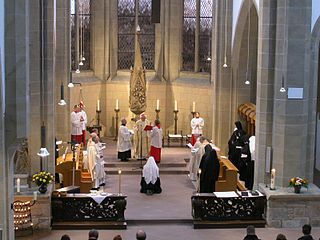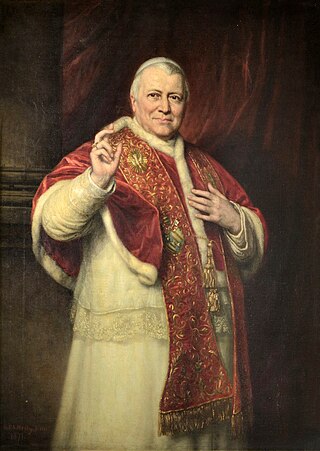Description
This constitution marked a distinct departure from the Tridentine law. It differed both as to the necessary age and other requirements for admission of men to solemn vows in orders, congregations, and institutes in which solemn vows were prescribed. The immediate occasion of its promulgation was the settlement, once and forever, of doubts which had arisen and been presented to the Holy See about the validity of solemn vows made without due observance of the decree Neminem Latet, i.e. without the three years' profession of simple vows.
It said that the Neminem latet regulation was intended to safeguard the religious orders, congregations, and institutes from losing their genuine spirit and former excellence by hastily and imprudently admitting youths having no true vocation and youths whose lives, morals, and bodily and mental endowments had not been properly investigated and no testimonial had been requested of, or received from, the bishop of their native place, or of the places where they had sojourned for the year immediately preceding their admission to the house of postulants.
The Neminem latet decree accomplished this by decreeing that novices, after the completion of their probation and novitiate, should make profession of simple vows for the term of three full years. This also included clerics after reaching sixteen years old or older (prescribed by the Council of Trent), and lay brothers, the age fixed by Pope Clement VIII (in Suprema). After the completion of their term, to be computed from the day of profession to the last hour of the third year, and if found worthy, they were to be admitted to solemn profession. Their superiors, for just and reasonable cause, could postpone the solemn profession. Such postponement was prohibited beyond the twenty-fifth year of age, except in the orders and countries where a longer term of simple profession was conceded by special indult of the Holy See.
Pius IX said that, nevertheless, novices had been admitted to solemn profession without the three years of simple vows. This gave great cause for doubt concerning the validity of the solemn profession. A decision upon that matter was requested from the Holy See. As the Neminem latet decree said nothing about nullity of solemn profession made in opposition to its regulation, the solemn profession made without the prescribed three years of simple vows was valid, though illicit.
In this papal constitution, Pius IX declared:
We, therefore, in a matter of such great importance, desiring to remove all occasion of future doubt, of Our own motion and certain knowledge, and in the plenitude of Our Apostolic power as regards the religious communities of men of whatever order, congregation, or institution in which solemn vows are made, do determine and decree to be null and void and of no value the profession of solemn vows, knowingly or ignorantly, in any manner, colour or pretext, made by novices or lay brothers, who, although they had completed the Tridentine probation and novitiate, had not previously made profession of simple vows and remained in that profession for the entire three years, even though the superiors, or they, or both respectively, had the intention of admitting to, or making, solemn vows, and had used all the ceremonies prescribed for solemn profession.
Women were not included in this law. They, unless special indults were granted, followed the Tridentine regulation until Pope Leo XIII (3 May 1902, Decretum perpensis) enjoined on them the same profession of simple vows for three years prior to the solemn profession, under penalty of nullity.

A nun is a woman who vows to dedicate her life to religious service and contemplation, typically living under vows of poverty, chastity, and obedience in the enclosure of a monastery or convent. The term is often used interchangeably with religious sisters who do take simple vows but live an active vocation of prayer and charitable work.

In the Catholic Church, a religious order is a community of consecrated life with members that profess solemn vows. They are classed as a type of religious institute.
A solemn vow is a certain vow taken by an at least 18 year old person individual after completion of the novitiate in a Catholic religious institute. It is solemn insofar as the Church recognizes it as such.
In the Catholic Church, a religious profession is the solemn admission of men or women into consecrated life by means of the pronouncement of religious vows, typically the evangelical counsels.
Investiture is a formal installation or ceremony that a person undergoes, often related to membership in Christian religious institutes as well as Christian knighthoods or damehoods, in addition to government offices.

Religious vows are the public vows made by the members of religious communities pertaining to their conduct, practices, and views.

The Society of the Divine Word, abbreviated SVD and popularly called the Verbites or the Divine Word Missionaries, and sometimes the Steyler Missionaries, is a Catholic clerical religious congregation of Pontifical Right for men. As of 2020, it consisted of 5,965 members composed of priests and religious brothers working in more than 70 countries, now part of VIVAT international. It is one of the largest missionary congregations in the Catholic Church. Its members add the nominal letters SVD after their names to indicate membership in the Congregation. The superior general is Paul Boedhie Kleden who hails from Indonesia.
A religious congregation is a type of religious institute in the Catholic Church. They are legally distinguished from religious orders – the other major type of religious institute – in that members take simple vows, whereas members of religious orders take solemn vows.
The Missionaries of Our Lady of La Salette are a religious congregation of priests and brothers in the Latin Church. They are named after the apparition of Our Lady of La Salette in France. There is also a parallel religious community of sisters called the Missionary Sisters of Our Lady of La Salette. A lay fraternal group of associates also works in cooperation with the vowed religious. The Missionaries are dedicated to making known the message of Our Lady of La Salette, a call to healing of inner brokenness and personal reconciliation with God, especially as found in the first three commandments. The missionaries are popularly known as "the La Salettes."

The Order of Saint Paul the First Hermit, commonly called the Pauline Fathers, is a monastic order of the Catholic Church founded in Hungary during the 13th century.

Michelangelo Celesia, O.S.B. Cas. was an Italian Benedictine monk who served as the Archbishop of Palermo from 1871 until his death, and was elevated to the cardinalate in 1884.
Ascendente Domino was a papal bull issued by Pope Gregory XIII, 24 May 1584, in favor of the Society of Jesus, to confirm the constitution of the Society, and the privileges already granted to it by Paul III, Julius III, Paul IV, and Pius V.

The theology of Pope Pius IX championed the pontiff's role as the highest teaching authority in the Church.
In the Catholic Church, a religious institute is "a society in which members, according to proper law, pronounce public vows, either perpetual or temporary which are to be renewed, however, when the period of time has elapsed, and lead a life of brothers or sisters in common."
In Catholicism, "of pontifical right" is the term given to ecclesiastical institutions either created by the Holy See, or approved by it with the formal decree known by the Latin name decretum laudis. The term is included in the names of institutions, often capitalised in English: "Institute of [xxx] of Pontifical Right".
Pietro Casani was an Italian Roman Catholic priest and a professed member of the Piarists. He became an assistant and a close personal friend of Giuseppe Calasanz. Casani had assumed the religious name of "Pietro della Natività di Maria" upon his solemn profession and had once been part of the Congregazione della Beata Vergine Maria that Giovanni Leonardi founded.
The Sisters of the Society of Saint Pius X are a semi-contemplative order of religious sisters founded by Archbishop Marcel Lefebvre on September 22, 1974. The motherhouse is located in Saint-Michel-en-Brenne, France, with additional houses in Argentina, Australia, Belgium, Germany, Italy, Switzerland and the United States. As of 2018, the current Superior General is Mother Maria Jean Bréant.

A religious sister in the Catholic Church is a woman who has taken public vows in a religious institute dedicated to apostolic works, as distinguished from a nun who lives a cloistered monastic life dedicated to prayer and labor, or a canoness regular, who provides a service to the world, either teaching or nursing, within the confines of the monastery. Nuns, religious sisters and canonesses all use the term "Sister" as a form of address.
The following outline is provided as an overview of and topical guide to the canon law of the Catholic Church:








